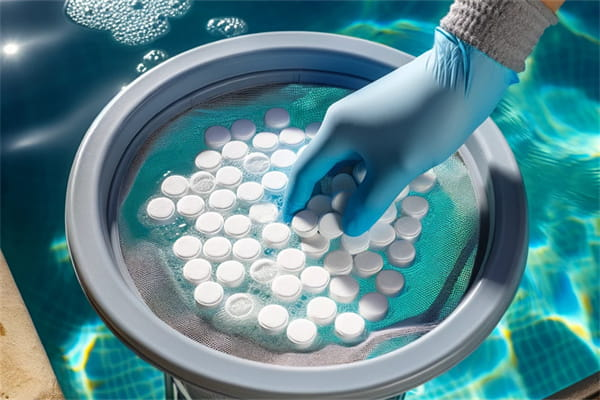Chlorine tablets are a staple in maintaining a clean and safe swimming pool, but what happens when they get wet before they are used? Can chlorine tablets still be used when they get wet? The short answer is yes, but there are several important factors to consider to ensure they remain effective and safe. In this blog, we’ll explore the effects of wet chlorine tablets, how to handle them, and tips for preventing them from getting wet in the first place.
Ⅰ. What Happens When Chlorine Tablets Get Wet
1.Dissolution Rate
When chlorine tablets get wet, they start to dissolve. This premature dissolution can lead to a few issues:
Uneven Dissolution: Wet tablets may dissolve unevenly, which can reduce their effectiveness in maintaining the desired chlorine levels in your pool.
Rapid Dissolution: They might dissolve too quickly, causing a sudden spike in chlorine levels that can be harmful to swimmers and potentially damage pool equipment.
2.Structural Integrity
Wet chlorine tablets can lose their structural integrity, becoming mushy or breaking apart. This not only makes them harder to handle but also affects their predictable dissolution rate, impacting their overall effectiveness.
3.Safety Concerns
Handling wet chlorine tablets poses safety risks as they can release chlorine gas, which is hazardous. It’s crucial to handle them with care and ensure the storage area is well-ventilated to avoid inhaling dangerous fumes.
Ⅱ. How to Handle Wet Chlorine Tablets
If you find yourself with wet chlorine tablets, here’s how you can manage them:
1.Dry Them Out
For tablets that are only slightly wet, you can try drying them out:
Spread Them Out: Place the wet tablets on a non-reactive surface, such as plastic or glass, to dry.
Ventilation: Ensure the area is well-ventilated to prevent the buildup of chlorine gas. Avoid enclosed spaces to reduce the risk of inhalation.
2.Use Them Promptly

If drying isn’t feasible or if the tablets are moderately wet, use them as soon as possible:
Add to Pool: Place the wet tablets in your pool’s floater, skimmer, or chlorinator immediately.
Monitor Chlorine Levels: Keep a close eye on the chlorine levels in your pool. Test frequently to ensure proper sanitation and adjust the number of tablets as necessary to maintain balanced levels.
3.Handle with Care
When dealing with wet chlorine tablets:
Wear Gloves: Protect your skin from direct contact with concentrated chlorine by wearing gloves.
Avoid Inhalation: Always work in a well-ventilated area to avoid inhaling chlorine fumes.
4.Dispose Safely
If the tablets have dissolved to the point where they are unusable:
Follow Local Regulations: Dispose of them according to local guidelines for hazardous materials.
Avoid Drains: Do not pour dissolved chlorine tablets down drains or mix them with other chemicals, as this can create hazardous reactions.
Ⅲ. Tips for Preventing Chlorine Tablets from Getting Wet
Preventing your chlorine tablets from getting wet in the first place is the best way to ensure their effectiveness. Here are some tips:
1.Proper Storage
Dry, Cool Place: Store chlorine tablets in a dry, cool area away from moisture.
Sealed Container: Use airtight containers to keep moisture out and maintain the tablets’ effectiveness. This also helps in preventing the release of chlorine gas.

2.Use Original Packaging
Keep the chlorine tablets in their original packaging until you are ready to use them. The packaging is designed to protect the tablets from moisture and environmental factors.
3.Inspect Regularly
Regular inspections can help you catch any issues early:
Humidity Control: Use desiccants or moisture absorbers in the storage area to control humidity levels.
Check for Leaks: Ensure that storage containers are intact and free from leaks to prevent moisture ingress.
Ⅳ. Conclusion
Wet chlorine tablets can still be used, but proper handling and storage are essential. By understanding their behavior when wet and taking preventive measures, you can ensure your pool remains clean and safe.

 Instant
Quote
Instant
Quote Email
Us
Email
Us